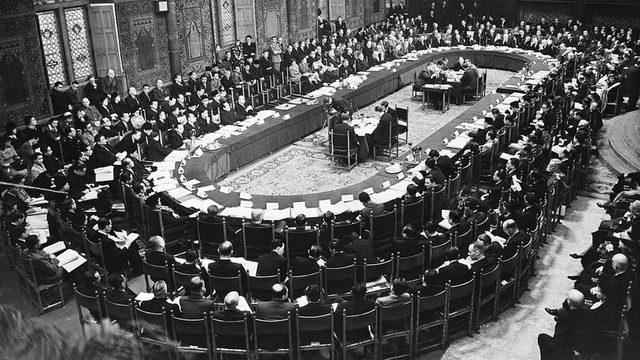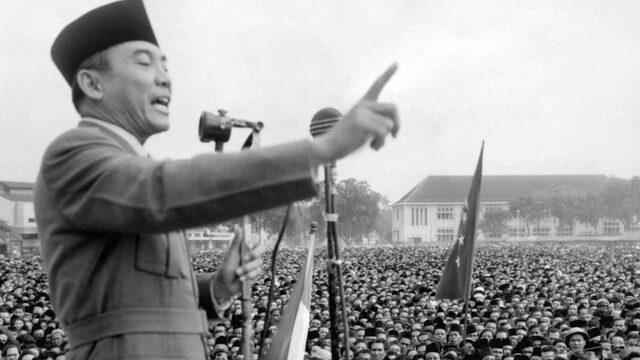During Indonesia’s war of independence, “The Netherlands used a wide range of structurally extreme violence,” according to independent research at the request of the Dutch government, and the Hague administration tacitly endorsed this.
Dutch soldiers resorted to methods such as extrajudicial executions, torture, arbitrary mass detentions, and arson of villages “to defeat the Indonesian Republic at all costs,” which had rebelled against colonial rule.
At the request of the government, the independent investigation initiated in 2017 led by the Dutch Institute for War and Genocide Studies (NIOD) was completed.
The report on the results of the research, presented to Prime Minister Mark Rutte on Thursday, refuted the Dutch thesis that “extreme violence is used only in exceptional cases” since 1969 regarding the events during Indonesia’s war of independence.
According to the research, during the independence struggle between 1945 and 1950, both Indonesians and Dutch used extreme violence, but the attitude of Dutch soldiers has always been ignored until now.
In the research of Dutch scientists, it was emphasized that a colonial attitude was dominant in the politicians and army administration in The Hague.
According to the report, Indonesians’ desire for independence was underestimated.
The Netherlands thought that Indonesian leader Ahmed Sukarno and his friends could not run an independent state.
According to the report, the rulers “confident in their own superiority” were guided by Dutch colonial desire.
For the Dutch, the war in Indonesia became “part of a tradition of violent oppression, racism and colonialism,” according to the researchers.
Controlling a vast area like Indonesia with very few troops was an impossible task, so the Dutch army quickly resorted to extreme violence.
Dutch soldiers used a wide range of extrajudicial killings, ill-treatment during interrogation, torture, rape, arbitrary mass detentions and arson of villages to suppress the war of independence.
implied consent
According to the report, the rulers in The Hague knew and tacitly endorsed the systematic violence in Indonesia.
“The investigation showed that the vast majority of those responsible on the Dutch side, such as politicians, bureaucrats, soldiers and judges, were or may have known about the systematic use of extreme violence,” the investigators said in a statement.
According to the researchers, “Dutch rulers at all levels had a desire to set aside written and unwritten rules of law and one’s own sense of justice.”
Researchers described the picture from 1945-1950 as “the image of a colonial war that was waged more and more brutally and at the same time, that was literally all-consuming.”
According to the report, Dutch governments, despite knowing too much about violence in Indonesia, paid little attention to the issue and avoided taking responsibility.
The Dutch public, including the media, was also not critical of the violence in Indonesia due to the “geographical and mental distance”.
Nor was “functional violence” such as killing prisoners of war, torture during interrogation, or burning villages almost ever punished in the Dutch Military Court.
“Even in rape or murder cases, Dutch judges ‘showed a great understanding of the military and their position’ and paid particular attention to military interests,” the report said.
According to local people, 100,000 Indonesians died.
The exact death toll in the Indonesian War of Independence is also unknown, as records are deliberately poorly kept, according to the researchers. According to locals, about 100,000 Indonesians and about 5,000 Dutch soldiers lost their lives.
Hans van Griensven, President of the Dutch Veterans Association, said they found the research too one-sided. Stating that both sides used violence, Van Griensven told public broadcaster NOS that the report focused too much on violence by the Netherlands, saying:
“It is claimed that everyone there on behalf of the Netherlands is a war criminal. This is untrue and harms veterans who are still alive. Research into Indonesia’s struggle for independence has also not taken into account the spirit of the times enough. We look at the past from today’s morals and norms.”
One of the researchers, Geert Oostindie, Director of the Royal Netherlands Institute for Linguistics, Geography and Ethnology, thinks that after this report, the Dutch government can no longer maintain its official position that “violence in Indonesia is the exception”.
Jeffry Pondaag, Chairman of the Dutch Honorary Obligations Committee, a foundation that seeks the rights of the victims of Dutch colonialism, emphasized that the research is a step towards correcting what happened in Indonesia, and said: “Unless the Netherlands openly declares itself as the perpetrator of war crimes, it is not newsworthy.”
The research, carried out at the request of the Dutch government, covers the period from the proclamation of the Republic of Indonesia by Sukarno on 17 August 1945 to the Hague Peace Conference on 27 December 1949, when the Netherlands signed the transfer of sovereignty.

It began to exploit in the 18th century
The Netherlands, which seized the trade in the region with the companies it established in the East Indies, made Indonesia a complete colony since the 18th century.
In the 1900s, pro-independence and anti-imperialist ideas began to spread in Indonesia, which was under Dutch rule for a long time.
The Nationalist Party, founded in 1927 under the leadership of Ahmed Sukarno, began to advocate independence. The Netherlands tried to suppress such demands very harshly and ruthlessly.
Indonesia was occupied by Japan in World War II. By allowing the nationalists to form a government, Japan supported the continued struggle for independence against the Netherlands.
Upon Japan’s defeat and surrender on August 17, 1945, the government led by Sukarno declared Indonesia’s independence.
The Netherlands did not recognize this decision and mobilized its military force for the bloody suppression of independence.
The war, in which more than 100,000 people died, according to local people, ended with the Hague Peace Conference on December 27, 1949.
As a result of the conference, the Netherlands officially recognized Indonesia.
